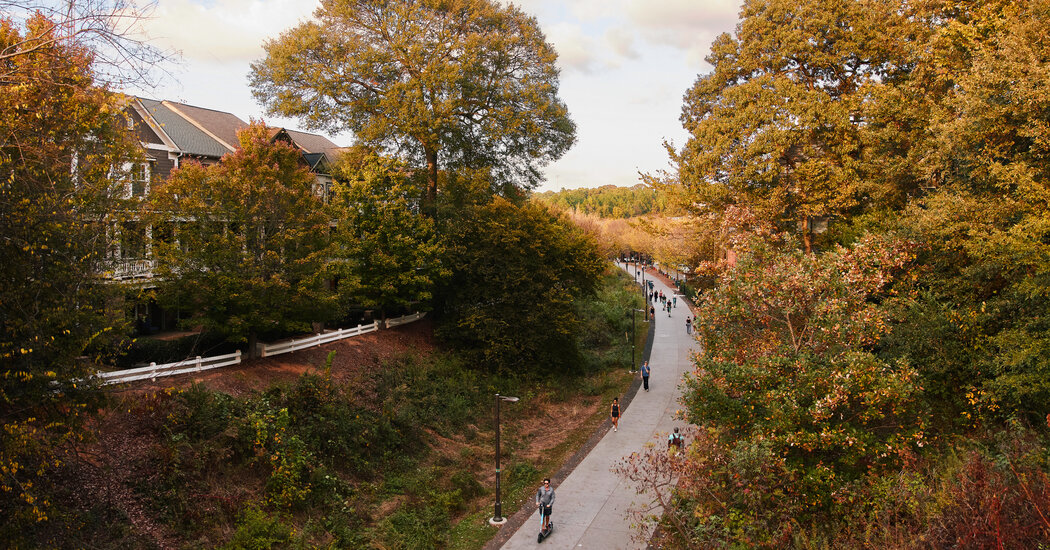For the last few summers in East Hampton, N.Y., many people have gotten up early in hopes of glimpsing Jay-Z on one of his early morning walks amid the shingled mansions of moguls such as David Zaslav, David Geffen and Ron Perelman.
But this season, the world’s most successful rapper has seemingly been upstaged by a new star in town: a wild American flamingo that has drawn hundreds of spectators in recent weeks.
It apparently made its way to this moneyed enclave of celebrities, plutocrats and tourists last month, taking up residence in Georgica Pond, a brackish coastal pond that lies between East Hampton and Wainscott. First to spot the wayward bird was Cathy Blinken, an Amazon Web Services senior marketing manager who spends time on the pond with her husband, David Blinken, a first cousin to Secretary of State Antony J. Blinken.
Ms. Blinken promptly called The East Hampton Star, which sent a reporter and photographer to break the story of the creature’s arrival. In the coming days, those who visited Georgica Pond to see the vagrant flamingo for themselves ended up disappointed. The bird had flown.
Days later, a flamingo with identical plumage was seen sunning itself roughly 200 miles away, on the shores of Cape Cod Bay in Massachusetts. It seemed that the bird might be one of those highfliers who, after surveying various summer outposts of the Northeast, had determined that Cape Cod was preferable to the scenic splendor of the scene-obsessed Hamptons.
But on June 9, Pietro Cicognani, an East Hampton architect, spotted the bird and made a call to The Star, which quickly published a follow-up to its scoop.
Jim Colligan, an avid birder who used to serve as a councilman on nearby Shelter Island, helped spread the news of the flamingo’s return. On Tuesday he found himself riding in the car of another area resident, Steven Spielberg, to catch a glimpse of the village’s principal attraction.
As Mr. Spielberg drove, Mr. Colligan directed him to a sandy pathway surrounded by partridgeberry vines and onto an inlet near the end of West End Road, not far from the former home of Kelly Klein, the ex-wife of Calvin Klein. From there, it was easy to spot the flamingo in the pond. This was less because of its distinctive plumage and more because of its stilt-like legs, which enabled it to walk the shallows with the gait of a Louboutin-clad supermodel.
The flamingo went into a routine that looked like a jig — it bent its right leg, then its left, then its right again. After that, it lowered its head into the water to dig up algae and invertebrates from the floor with its hooked beak. On the other side of the pond, nearly a dozen birders stood with binoculars and cameras.
More gawkers showed up as the week went on. Kerry Lyons, a day-tripper from Westchester County, N.Y., nearly doubled over when she was informed that there was a flamingo in the pond.
“Really?” she said. “Shut up!”
A birder in a Hawaiian shirt invited Ms. Lyons to look through his telescope, and her doubts were replaced by questions about how on earth it had gotten there.
“Did it take a wrong turn?” she asked.
According to Jerry Lorenz, a marine biologist and the director of research for Audubon Florida, the wrong-turn theory is indeed plausible.
In a phone interview, Mr. Lorenz said that Hurricane Idalia, which swept into Florida in August 2023, may have had something to do with the bird’s arrival in the Hamptons. To escape the storm, flocks of flamingos flew north, leading to rare sightings of the brightly colored creatures in Kentucky, Ohio, Pennsylvania and Virginia.
Most of those birds went back to where they had come from. But it is not uncommon for a flamingo to break off from a flock, either because it is disoriented or because its pals get killed, Mr. Lorenz said. A few mavericks, he noted, may simply decide to go exploring.
“There are examples of a flamingo hanging out by itself for years,” Mr. Lorenz said, going on to tell the tale of Peaches, a flamingo who spent years living the single life at the St. Marks National Wildlife Refuge in the Florida Panhandle, rejecting multiple flocks before making some friends after last year’s hurricane season.
“Then it left with them,” he said.
Flamingos are found throughout the world, from tropical regions to the Andes in South America. They get their distinctive hue from the carotenoid pigments in the crustaceans and algae that make up their diet. Tough and sturdy, they can fly as fast as 40 miles per hour, according to the American Bird Conservancy.
They tend to make news when they escape their usual habitats. In 1964, The New York Times reported on a flamingo sighting in Niantic, Conn. An African flamingo that escaped a zoo in Wichita, Kan., in 2005 was still generating headlines in 2022, when it was spotted in Port Lavaca, Texas. Pink Floyd, a flamingo that escaped an aviary in Salt Lake City, lived in the Great Salt Lake for part of each year from 1988 to 2005.
The Hamptons flamingo has managed to establish friendly relations with some longtime residents of Georgica Pond — a flock of sometimes ornery swans.
“He gets along with them,” said Lars Svanberg, a surfing instructor who was eyeing the flamingo as swans swam circles around it. “They’re all hanging out together!”
Mr. Lorenz, who has studied photos and videos of the flamingo in Georgica Pond, said it was in no immediate need of intervention from rescue groups.
“That’s a healthy bird,” he said. “It’s flying just fine. It’s feeding just fine. Leave it alone.”







